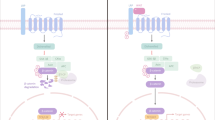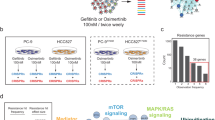Abstract
Mutational analysis of oncogenes is critical for our understanding of cancer development. Oncogenome screening has identified a fibroblast growth factor receptor 4 (FGFR4) Y367C mutation in the human breast cancer cell line MDA-MB453. Here, we investigate the consequence of this missense mutation in cancer cells. We show that MDA-MB453 cells harbouring the mutation are insensitive to FGFR4-specific ligand stimulation or inhibition with an antagonistic antibody. Furthermore, the FGFR4 mutant elicits constitutive phosphorylation leading to an activation of the mitogen-activated protein kinase cascade as shown by an enhanced Erk1/2 phosphorylation. Cloning and ectopic expression of the FGFR4 Y367C mutant in HEK293 cells revealed high pErk levels and enhanced cell proliferation. Based on these findings, we propose that FGFR4 may be a driver of tumour growth, particularly when highly expressed or stabilized and constitutively activated through genetic alterations. As such, FGFR4 presents an option for further mutational screening in tumours and is an attractive cancer target with the therapeutic potential.
This is a preview of subscription content, access via your institution
Access options
Subscribe to this journal
Receive 50 print issues and online access
$259.00 per year
only $5.18 per issue
Buy this article
- Purchase on Springer Link
- Instant access to full article PDF
Prices may be subject to local taxes which are calculated during checkout






Similar content being viewed by others
References
Ansell A, Farnebo L, Grenman R, Roberg K, Thunell LK . (2009). Polymorphism of FGFR4 in cancer development and sensitivity to cisplatin and radiation in head and neck cancer. Oral Oncol 45: 23–29.
Bange J, Prechtl D, Cheburkin Y, Specht K, Harbeck N, Schmitt M et al. (2002). Cancer progression and tumor cell motility are associated with the FGFR4 Arg(388) allele. Cancer Res 62: 840–847.
Bardelli A, Parsons DW, Silliman N, Ptak J, Szabo S, Saha S et al. (2003). Mutational analysis of the tyrosine kinome in colorectal cancers. Science 300: 949.
Bignell G, Smith R, Hunter C, Stephens P, Davies H, Greenman C et al. (2006). Sequence analysis of the protein kinase gene family in human testicular germ-cell tumors of adolescents and adults. Genes Chromosomes Cancer 45: 42–46.
Chesi M, Brents LA, Ely SA, Bais C, Robbiani DF, Mesri EA et al. (2001). Activated fibroblast growth factor receptor 3 is an oncogene that contributes to tumor progression in multiple myeloma. Blood 97: 729–736.
d'Avis PY, Robertson SC, Meyer AN, Bardwell WM, Webster MK, Donoghue DJ . (1998). Constitutive activation of fibroblast growth factor receptor 3 by mutations responsible for the lethal skeletal dysplasia thanatophoric dysplasia type I. Cell Growth Differ 9: 71–78.
Dailey L, Ambrosetti D, Mansukhani A, Basilico C . (2005). Mechanisms underlying differential responses to FGF signaling. Cytokine Growth Factor Rev 16: 233–247.
Elbashir SM, Harborth J, Weber K, Tuschl T . (2002). Analysis of gene function in somatic mammalian cells using small interfering RNAs. Methods 26: 199–213.
Ercolino T, Lombardi A, Becherini L, Piscitelli E, Cantini G, Gagliano MS et al. (2008). The Y606C RET mutation causes a receptor gain of function. Clin Endocrinol (Oxf) 69: 253–258.
Eswarakumar VP, Lax I, Schlessinger J . (2005). Cellular signaling by fibroblast growth factor receptors. Cytokine Growth Factor Rev 16: 139–149.
Fishman DA, Liu Y, Ellerbroek SM, Stack MS . (2001). Lysophosphatidic acid promotes matrix metalloproteinase (MMP) activation and MMP-dependent invasion in ovarian cancer cells. Cancer Res 61: 3194–3199.
Giri D, Ropiquet F, Ittmann M . (1999). Alterations in expression of basic fibroblast growth factor (FGF) 2 and its receptor FGFR-1 in human prostate cancer. Clin Cancer Res 5: 1063–1071.
Greenman C, Stephens P, Smith R, Dalgliesh GL, Hunter C, Bignell G et al. (2007). Patterns of somatic mutation in human cancer genomes. Nature 446: 153–158.
Ho HK, Pok S, Streit S, Ruhe JE, Hart S, Lim KS et al. (2009). Fibroblast growth factor receptor 4 regulates proliferation, anti-apoptosis and alpha-fetoprotein secretion during hepatocellular carcinoma progression and represents a potential target for therapeutic intervention. J Hepatol 50: 118–127.
Itoh N, Ornitz DM . (2004). Evolution of the Fgf and Fgfr gene families. Trends Genet 20: 563–569.
Koziczak M, Holbro T, Hynes NE . (2004). Blocking of FGFR signaling inhibits breast cancer cell proliferation through downregulation of D-type cyclins. Oncogene 23: 3501–3508.
Ma Z, Tsuchiya N, Yuasa T, Inoue T, Kumazawa T, Narita S et al. (2008). Polymorphisms of fibroblast growth factor receptor 4 have association with the development of prostate cancer and benign prostatic hyperplasia and the progression of prostate cancer in a Japanese population. Int J Cancer 123: 2574–2579.
Rhodes DR, Yu J, Shanker K, Deshpande N, Varambally R, Ghosh D et al. (2004). ONCOMINE: A cancer microarray database and integrated data-mining platform. Neoplasia 6: 1–6.
Roidl A, Berger HJ, Kumar S, Bange J, Knyazev P, Ullrich A . (2009). Resistance to chemotherapy is associated with fibroblast growth factor receptor 4 up-regulation. Clin Cancer Res 15: 2058–2066.
Rousseau F, el Ghouzzi V, Delezoide AL, Legeai-Mallet L, Le MM, Munnich A, Bonaventure J . (1996). Missense FGFR3 mutations create cysteine residues in thanatophoric dwarfism type I (TD1). Hum Mol Genet 5: 509–512.
Ruhe JE, Streit S, Hart S, Wong CH, Specht K, Knyazev P et al. (2007). Genetic alterations in the tyrosine kinase transcriptome of human cancer cell lines. Cancer Res 67: 11368–11376.
Sasaki H, Okuda K, Kawano O, Yukiue H, Yano M, Fujii Y . (2008). Fibroblast growth factor receptor 4 mutation and polymorphism in Japanese lung cancer. Oncol Rep 20: 1125–1130.
Shaoul E, Reich-Slotky R, Berman B, Ron D . (1995). Fibroblast growth factor receptors display both common and distinct signaling pathways. Oncogene 10: 1553–1561.
Stephens P, Edkins S, Davies H, Greenman C, Cox C, Hunter C et al. (2005). A screen of the complete protein kinase gene family identifies diverse patterns of somatic mutations in human breast cancer. Nat Genet 37: 590–592.
Stephens P, Hunter C, Bignell G, Edkins S, Davies H, Teague J et al. (2004). Lung cancer: intragenic ERBB2 kinase mutations in tumours. Nature 431: 525–526.
Streit S, Bange J, Fichtner A, Ihrler S, Issing W, Ullrich A . (2004). Involvement of the FGFR4 Arg388 allele in head and neck squamous cell carcinoma. Int J Cancer 111: 213–217.
Streit S, Mestel DS, Schmidt M, Ullrich A, Berking C . (2006). FGFR4 Arg388 allele correlates with tumour thickness and FGFR4 protein expression with survival of melanoma patients. Br J Cancer 94: 1879–1886.
Thomas RK, Baker AC, Debiasi RM, Winckler W, Laframboise T, Lin WM et al. (2007). High-throughput oncogene mutation profiling in human cancer. Nat Genet 39: 347–351.
Thussbas C, Nahrig J, Streit S, Bange J, Kriner M, Kates R et al. (2006). FGFR4 Arg388 allele is associated with resistance to adjuvant therapy in primary breast cancer. J Clin Oncol 24: 3747–3755.
Vargas RA, Maegawa GH, Taucher SC, Leite JC, Sanz P, Cifuentes J et al. (2003). Beare-Stevenson syndrome: two South American patients with FGFR2 analysis. Am J Med Genet A 121A: 41–46.
Wang J, Yu W, Cai Y, Ren C, Ittmann MM . (2008). Altered fibroblast growth factor receptor 4 stability promotes prostate cancer progression. Neoplasia 10: 847–856.
Weinstein IB . (2002). Cancer. Addiction to oncogenes—the Achilles heal of cancer. Science 297: 63–64.
White KE, Cabral JM, Davis SI, Fishburn T, Evans WE, Ichikawa S et al. (2005). Mutations that cause osteoglophonic dysplasia define novel roles for FGFR1 in bone elongation. Am J Hum Genet 76: 361–367.
Wilkie AO . (2005). Bad bones, absent smell, selfish testes: the pleiotropic consequences of human FGF receptor mutations. Cytokine Growth Factor Rev 16: 187–203.
Yamaguchi F, Saya H, Bruner JM, Morrison RS . (1994). Differential expression of two fibroblast growth factor-receptor genes is associated with malignant progression in human astrocytomas. Proc Natl Acad Sci USA 91: 484–488.
Acknowledgements
We thank Heike Stubbe for excellent technical support and Dr Peter Czernilofsky for critically reading the manuscript. This work was supported by the National Genome Research Network 2/CancerNet, Grant Number: NGFN2/CancerNet no. 01GS0435, and the Agency for Science Technology and Research (A*STAR), Singapore.
Author information
Authors and Affiliations
Corresponding author
Additional information
Supplementary Information accompanies the paper on the Oncogene website (http://www.nature.com/onc)
Supplementary information
Rights and permissions
About this article
Cite this article
Roidl, A., Foo, P., Wong, W. et al. The FGFR4 Y367C mutant is a dominant oncogene in MDA-MB453 breast cancer cells. Oncogene 29, 1543–1552 (2010). https://doi.org/10.1038/onc.2009.432
Received:
Revised:
Accepted:
Published:
Issue Date:
DOI: https://doi.org/10.1038/onc.2009.432
Keywords
This article is cited by
-
Fibroblast growth factor receptors in cancer: genetic alterations, diagnostics, therapeutic targets and mechanisms of resistance
British Journal of Cancer (2021)
-
Evaluation of FGFR targeting in breast cancer through interrogation of patient-derived models
Breast Cancer Research (2021)
-
FGFR3 signaling and function in triple negative breast cancer
Cell Communication and Signaling (2020)
-
KAOS: a new automated computational method for the identification of overexpressed genes
BMC Bioinformatics (2016)
-
Rationale for targeting fibroblast growth factor receptor signaling in breast cancer
Breast Cancer Research and Treatment (2015)



